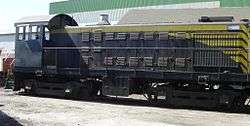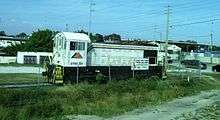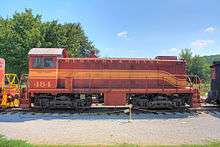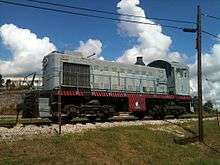ALCO S-2 and S-4
| ALCO S-2 and S-4 | |||||||||||||||||||||||||||||||||||||||||||
|---|---|---|---|---|---|---|---|---|---|---|---|---|---|---|---|---|---|---|---|---|---|---|---|---|---|---|---|---|---|---|---|---|---|---|---|---|---|---|---|---|---|---|---|
 Grafton and Upton Railroad #1001, an S-4, rests in Hopedale, MA on May 11, 2008 | |||||||||||||||||||||||||||||||||||||||||||
| |||||||||||||||||||||||||||||||||||||||||||
| |||||||||||||||||||||||||||||||||||||||||||
| |||||||||||||||||||||||||||||||||||||||||||
| |||||||||||||||||||||||||||||||||||||||||||
The ALCO S2 and S4 were 1,000 horsepower (746 kW) diesel electric switchers produced by ALCO and Canadian licensee Montreal Locomotive Works (MLW). Basically, the two locomotives differed only in trucks, with the S-2 using ALCO's own "Blunt" trucks, and the S-4 riding on standard AAR type A switcher trucks. Both were powered by ALCO 539 turbocharged, 6-cylinder diesels. The S-2 was built between August 1940 and June 1950, with a total of 1502 completed, while the S-4 was constructed between June 1949 and August 1957 (MLW until 1957) with total sales of 797. Canadian production of the S-4 started more than a year before U S production of the S-4. ALCO did not start building the S-4 until August 1950. A modified version, the S-7, was built by MLW only; 29 were built between June and August 1957.
Design
The exterior of the locomotives were styled by an Alco engineer, Ray Patten, using curves in a mild application of Art Deco principles.[1]
Identification
The S-2 and S-4 are distinguishable externally from the very similar S-1 and S-3 660 hp (492 kW) switchers in that they have a larger exhaust stack with an oblong base and a larger radiator shutter area on the nose sides. The S-1/S-3 radiator shutter area is taller than it is wide, while the S-2/S-4 radiator area is wider. The larger stack is due to turbocharging. The carbody and cab of late S-2s are nearly indistinguishable from those of S-4s. Hence, a truck swap can cause many to misidentify a unit.
Survivors
A few S4s are still in service on shortline railroads around the United States. Several more are preserved in US and Canadian railroad museums.
An S-2, of D&RGW heritage, survives on the Big South Fork Scenic Railway, as number 102. It was purchased in February 1964 for the Kentucky and Tennessee Railway, and is in operable condition in Stearns, Kentucky. This was one of the diesels that replaced Southern 2-8-2 #4501 on the K&T.
SP1474 is in operation, in rotation, at the Orange Empire Railway Museum in Perris, CA, pulling a tourist train on weekends.
Western Pacific 563, one of 2 S4s purchased by that railroad, is today preserved at the Western Pacific Railroad Museum at Portola, California.
Fore River Transportation has at least one S-4 in a derelict state being used for parts.
New York, Susquehanna and Western Railway S2 #206 sits cosmetically restored at Maywood Station in Maywood, New Jersey.[2]
The Cooperstown and Charlotte Valley Railroad operates a pair of restored ex-Canadian National units. S4 #3051 and S7 #3052 are both in regular tourist passenger and maintenance of way service between Milford and Cooperstown, NY.
Muskogee, Oklahoma at the Three Rivers Museum a S-2 #63-138 sits outside in the back of the Midland Valley Station.
The Houston Railroad Museum in Houston, Texas have two S-2's; Ex Santa Fe, #2350 and Ex Houston Belt and Terminal, #14.

Conrad Yelvington Distributors, an aggregate supplier in Orlando, Florida, owns a former Chesapeake & Ohio S-2, now numbered 224. Though not used as often as their EMD SW9 number 2112, the unit is operational.
Louisville & Nashville rebuilt many of their Alco switchers with 12-567 EMD prime movers in an effort to standardize their switching fleet. One of these, S4 (or S4m as rebuilt) #2326 survives at Gerdau Ameristeel in Cartersville, GA. Ameristeel recently donated the locomotive to the Southeastern Railway Museum at Duluth, GA.
The Oil Creek and Titusville Railroad operates S-2s #75 and #85 on its tourist/freight railroad.
The Virginia & Truckee Railroad acquired an S-4 from PPL Montana in 2010. The locomotive is in operable condition & slowly being repainted to the railroad's diesel colors.
Class III railroad Toledo, Lake Erie, and Western owns four ALCO S-2 and S-4s. TLEW 62, a S-2 purchased in 2012, ex. Delray Cement 62, TLEW 112, a S-2 that was part of the original TLEW roster, now reduced to a parts unit as of 2010, TLEW 5109, a S-4, and the only operating ALCO on the line currently. 5109 recently was repainted into its original Chesapeake and Ohio colors in September 2013. TLEW 5109's horn was stolen during the repainting process. TLEW 9752, a S-4 of Penn Central and Pittsburgh & Lake Erie heritage, was not used much, and was eventually scrapped for parts in October 2010.
Heritage Cooperative in Mechanicsburg, Ohio, is the latest in a string of owners for the former Baltimore & Ohio 9040, an operating S-2 that retains her second B&O number. She was built as B&O 496 in 1945.

The North Alabama Railroad Museum in Huntsville, Alabama runs an S-2 in regular tourist excursions, Mercury and Chase #213. It also owns another S-2, Mercury & Chase #484, which was temporarily out of service due to cylinder repair, but returned to service with #213 in 2018. They also have ex-Santa Fe #1534, which is an S-4.
San Francisco Bay Railroad, the short-line railroad for the Port of San Francisco, operates the #23 and #25 Alco S-2's from the San Francisco Belt Line Railroad.
In the mid-1960s, Hamersley Iron purchased an S-2 for use in the Pilbara region of Western Australia.[3]
The Beech Mountain Railroad at Alexander, in North Central West Virginia Rosters an S-2, numbered 113 and an S-4, numbered 115 for their 8 mile long coal hauling line. Both were built new for Michigan Limestone and Chemical Company.

ADMX "E'Ville" 1 (Ex-MRS 210) was on static display in Evansville, Indiana, near CSX Transportation's Howell terminal. ADM scrapped it in early Fall of 2017.
Currently the MD&W short line railroad in northern Minnesota uses S-2s to help former Boise Cascade now just Boise paper mill set out goods to the former Burlington Northern main line railroad now Canadian National, within the last 10 years MD&W has purchased an EMD SW-10 to help switching duties
See also
References
- ↑ "Locomotives-Canadian Pacific 7020". Toronto Railway Historical Association. 2001–2014. Retrieved August 30, 2014.
- ↑ "{title}". Archived from the original on 2009-05-26. Retrieved 2009-06-02.
- ↑ Exhibits Pilbara Railway Historical Society
- Dorin, Patrick C. (1972). Chicago and North Western Power. Burbank, California: Superior Publishing. p. 136. ISBN 0-87564-715-4.
- Pinkepank, Jerry A. (1973). The Second Diesel Spotter's Guide. Kalmbach Publishing Co., Milwaukee, WI. p. 224. ISBN 0-89024-026-4.
- Toppan, Andrew et al. Alco/MLW S-2 Roster. Retrieved on December 29, 2005.
- Toppan, Andrew et al. Alco/MLW S-4 Roster. Retrieved on December 29, 2005.
- Steinbrenner, Richard T. (2003). The American Locomotive Company: A Centennial Remembrance. On Track Publishers LLC, New Brunswick, NJ. ISBN 0-911122-07-9.